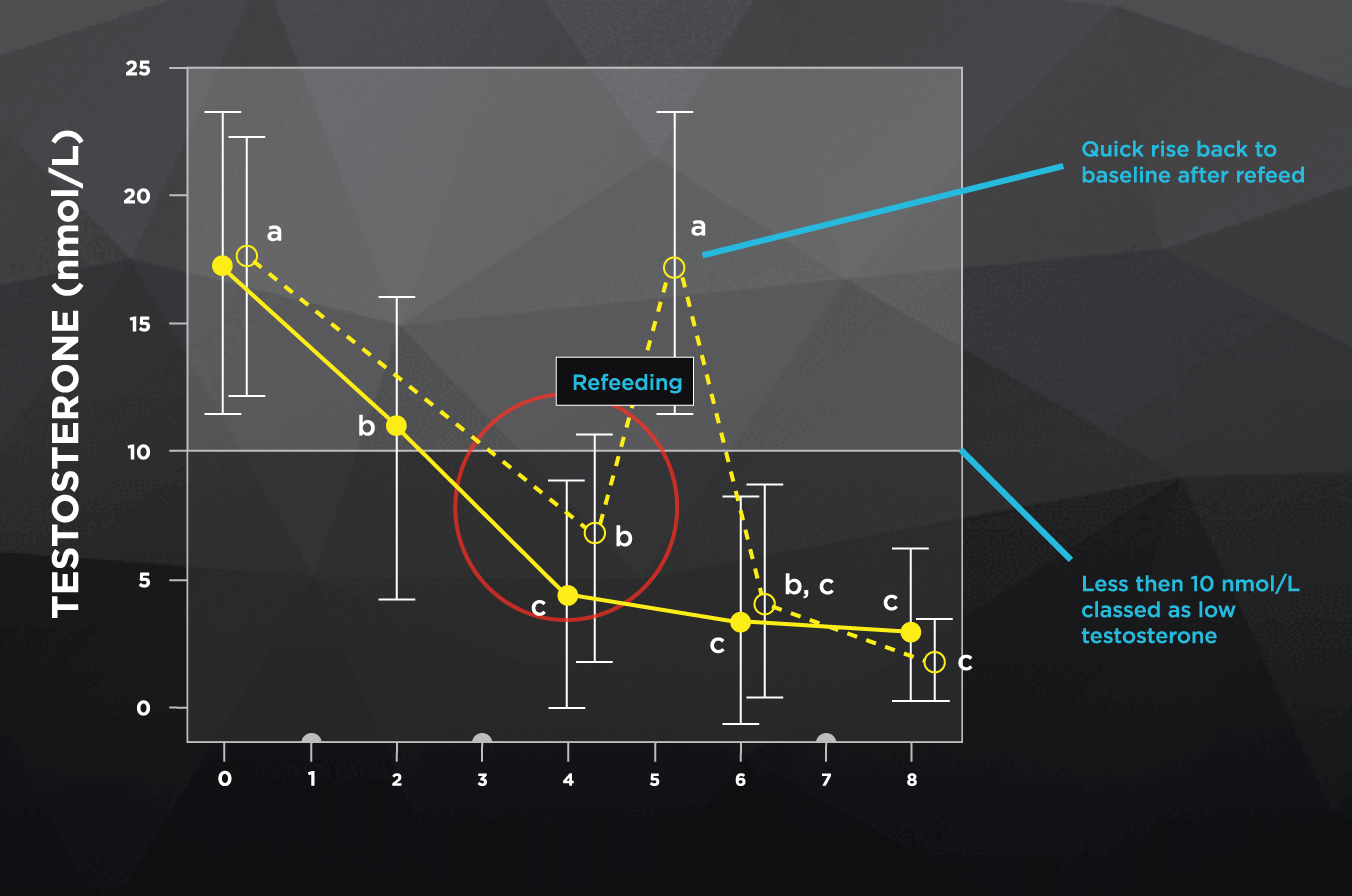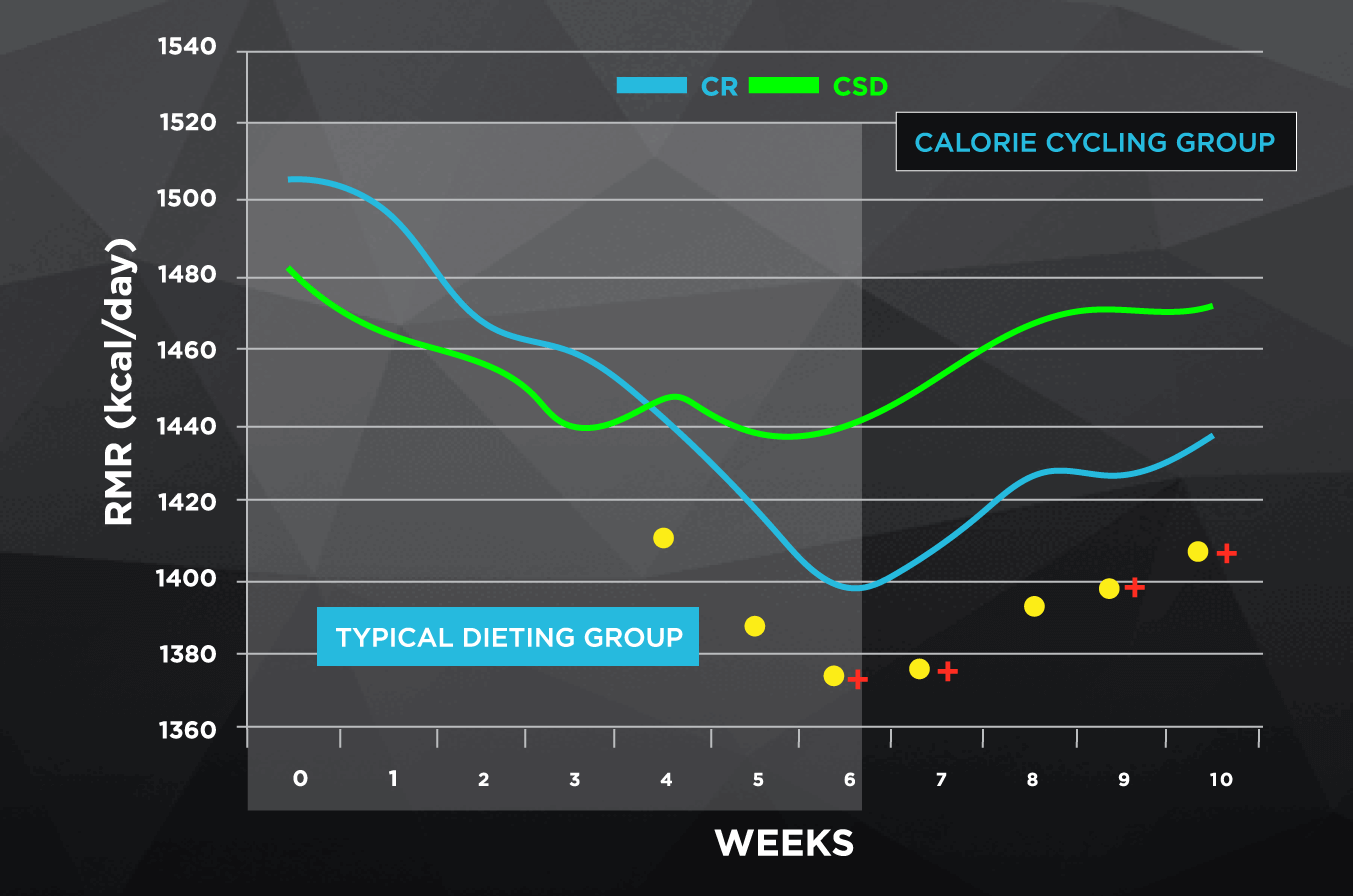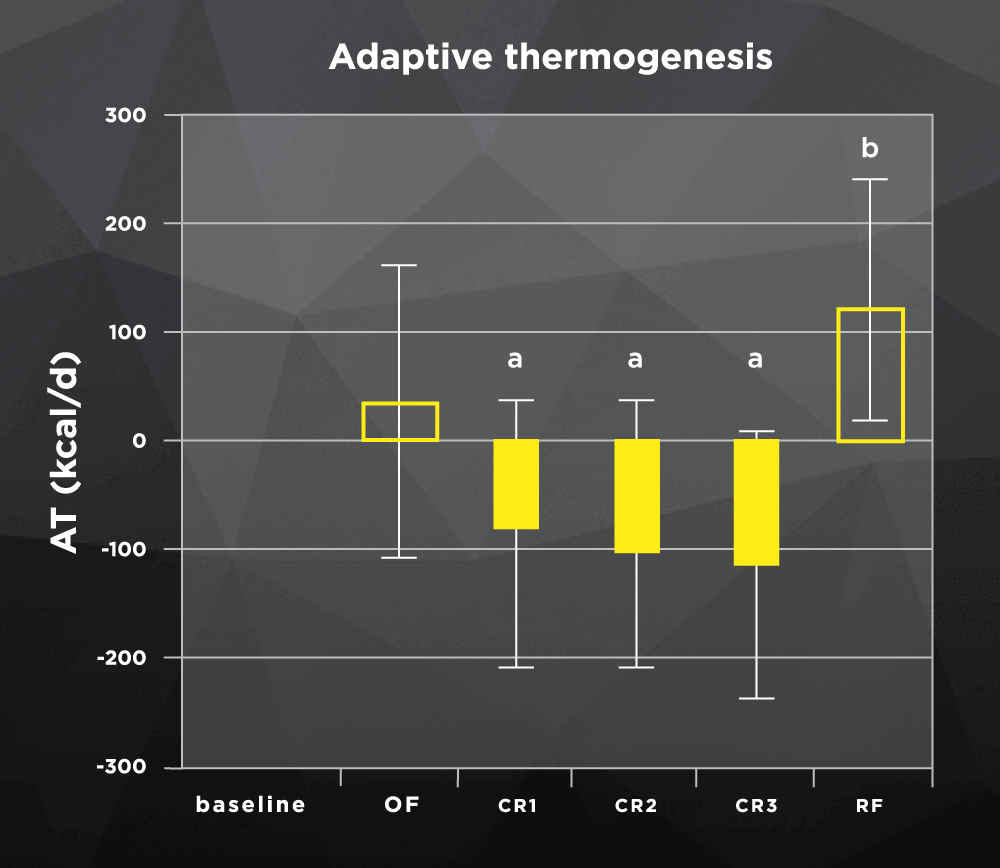Any seasonal Biolayne member will be aware of potential metabolic damage or adaptations that occur during a diet.
But, do you know exactly what these specific adaptations are and the significant importance of each?
Supported by the shocking weight loss maintenance statistics, one could argue these adaptations are setting you up to fail every step of the way. This likely explains the often rapid fat regain after a diet and shows that your body does everything in its power to return back to what it classes as “normal” [1].
In this article you will learn the specific adaptations that occur and best of all, you will learn some research-proven strategies to counter this adaptations and improve your chance of long-term success!
Your Body is Built to Survive
While this may seem to be an obvious and over-simplified statement, if we think back to centuries ago, then we can understand why the body has all these in-built strategies trying to self-regulate and counter our attempts to lose weight.
Simply, we were built and evolved to survive. At the end of the day, if our ancestors didn’t manage to survive the harsh winters, long fasts without food and countless diseases we wouldn’t be here today. [2]
While the modern western world is now very well equipped to handle these challenges, our body doesn’t necessarily sense this. For example, when dieting down to single digit bodyfat, our body and brain doesn’t know that you are surrounded by food.
Remember, some of the role of bodyfat is to protect your organs, store energy for long periods of no food and provide insulation. As I like to say, your body doesn’t care how badly you want your abs or single digit bodyfat, it senses this leanness as a threat and dangerous situation. Years ago in winter, those with chiseled abs would be the first to die from hyperthermia or starvation! [3][4]
Now it’s clear to see why your body will close down or reduce certain processes to conserve energy. Much like your laptop will go into energy-saving mode when the battery is low, your body is trying to last as long as possible.
This helps explain why your body will actually burn less calories when doing the exact same workout or send signals to your brain to eat (and overeat when you do), then store more bodyfat from the food you eat and decrease your total daily energy expenditure!
You should now see that we are actually going against the body when dieting for months, or down to single digit bodyfat.
Metabolic Adaptations to Weight Loss
As discussed, your body is going to do literally the opposite to what you would want for easy and sustainable fat loss. These adaptations are still being discovered. For now the main adaptations include:
Increase in the Hunger Hormone Ghrelin: Secreted in the gut, Ghrelin is known as the main hunger hormone which tells your brain you are hungry and to overeat on food. The post-contest 5000 calorie cheat meals or binges can be partly explained by the alterations here. [5][6]
Decrease in Leptin: The opposing hormone to Ghrelin, Leptin functions more as a satiety hormone telling your brain when you’ve consumed enough food and should stop eating. As this decreases, similar issues occur, such as increased hunger and overeating [7][8]
Decrease in Thyroid & Metabolism: Thyroid is a hormone responsible for your metabolism or more simply, how many calories you burn per day. Studies have shown both your thyroid hormone and daily metabolism become significantly down regulated even after a 2 week diet. In an obese weight loss study they noticed a whopping 500 calorie decrease [9][10][11][12]
Decrease in Anabolic Hormones: Key hormones such as testosterone can also be drastically down regulated, which helps explain why many males get deficient like symptoms as they become very lean or during contest prep. In one study, just a 2 week diet rapidly decreased males’ testosterone levels by 66%, from a healthy and relatively high range to deficient levels. Most people understand the power of testosterone for building muscle, energy, health and performance! [13][14]
Decrease in Daily Activity: Research has repeatedly shown that when you diet your body will naturally perform less activity to save calories. This may include taking the elevator instead of the stairs, not walking as much and even just less general movement when sat at your desk, such as tapping your leg etc. This activity, known as Non Exercise Activity Thermogenesis (NEAT) is an important part of your overall calorie expenditure and both weight loss and weight maintenance! [15][16][17]
Less Calories Burnt During Exercise: Interestingly, your body will even find a way to burn less calories doing the exact same workout. For example, in a 60 minute gym session you may burn 10-20% less calories than normal, even if your routine, reps and intensity are identical. In one study discussed below, a short 3 week diet reduced calories burned during cardio by a whopping 22%. This is just another way your body will try to fight the calorie deficit you are in and shows how more exercise doesn’t always equal greater fat loss! [18][19][20]
Combined, it should be very easy to see how these factors make it harder and harder to lose weight and keep it off successfully. Your body is going to adapt and make you more hungry, more likely to overeat, more likely to pick high energy dense processed foods, burn less calories per day and even burn less calories when you exercise! All of these are a disaster for weight loss, so, what is the solution?
How to Dodge the Metabolic Adaptations
Because it’s your body’s natural defense system, no matter what you do there will be some form of metabolic adaptations. However, that’s not to say you can’t optimize your dieting strategy to reduce them and, possibly improve your success in the long term.
Recently, several studies have investigated possible strategies to reduce these effects and while the research is far from conclusive, initial findings are very interesting. [21][22][23]
In short, these techniques all use higher calorie periods placed at specific time points throughout the diet. In theory, these higher calorie periods will hit the re-start button on your diet, giving your hormones and body a break, which may reduce the negative down regulations in hormones and metabolism.
While it may sound detrimental to your weight loss efforts, some studies have shown that you can still lose weight just as fast, while having some higher calorie days. This may be a win win for your body and brain, as you will get regular higher calorie periods that add some flexibility to your diet. Although a 20 week prep or diet can sound daunting, 5 mini 4 week diets seem much more manageable for most. [24]
Here’s an overview of the current research:
Study 1: Dieting’s Effect on Testosterone
For both genders testosterone functions as a key hormone in health, performance and body composition. While it is obviously more important in males, it can still play important roles in the female athlete. [25][26][27][28]
During a diet the down regulation of testosterone can be extremely severe and may never fully recover. This is especially true for those staying very lean or who compete on a regular basis; they may find they become deficient in their 20s. As you may know, testosterone deficiency is linked with many serious diseases and makes it harder to gain strength, muscle or lose fat. [29][30][31]
This study really highlighted the rapid decline that can occur when the combination of calorie restriction, intense training and sleep reduction occurs. Although conducted in a US Rangers’ course, the issues above mimic a typical contest prep or diet extremely well.
As shown below, you can see the sharp decline when participants were placed in a severe deficit (1000-1200 calories) and during the 8 week army US Ranger Course. [32]

Not only did they find a large drop in testosterone levels, but they also witnessed reductions in thyroid T3 (metabolism), IGF-1 and increased Cholesterol. However, at week 4 you can see the refeed restored testosterone levels back to normal. Although this study only tested one refeed, it is possible that more regular refeeds during a long diet or contest prep can be beneficial.
Study 2: High Calorie Periods on Weight Loss and Metabolism
This study is possibly the most relevant study conducted to date as they performed a head to head trial, with one group just dieting normally (i.e. no dieting breaks / refeeds) and the other group having a 3 day refeed every 11 days (i.e. 11 day diet, 3 day refeed). [33]
They compared these methods and their effects on weight loss, metabolism and hormones over a 6 week period, followed by a 4 week maintenance period. Despite what you may think, the group that used the higher calorie refeeds (9 or 42 days, i.e. over 20% of the dieting period) actually lost slightly more weight than those that just continually dieted for the whole 6 weeks!
So despite the fact that they got more food, the psychological breaks improved their dietary adherence and enjoyment. When assessed, they had actually lost more weight and had their hormones protected to a greater extent.
As you can see below, the calorie cycling / refeed group actually started with a slightly lower metabolic rate. However, by the end of the diet, their metabolic rate was significantly higher, only dropping by around 40 calories compared to over 100 calories.

In the 4 week maintenance, you can see that the typical dieting group’s metabolism did not return to normal and worst still, they re-gained more of the weight loss when compared to the refeed / calorie cycling group.
Study 3: Effect of 1 Week High Calorie Refeed on Several Key Hormones and Metabolism
This final study released last year was extremely comprehensive and monitored most of the hormones and adaptations discussed above. Their main focus was investigating the “adaptive thermogenesis” which occurs during a diet. [34]
“Adaptive Thermogenesis” describes the decline in metabolism after we account for the changes in bodyweight. In other words, they account for the natural decline because we have lost weight and are now lighter (i.e. we expend less calories moving, as there is less resistance). [35]
In the study, they tested a 3 week diet followed by a 1 week refeed in healthy non obese men, which more accurately reflects the fitness enthusiast. As shown below, there was a quick 100 calorie decline after just 2 weeks. However, a 1 week refeed helped restore these levels and even elevated their metabolism beyond starting levels.

They also found changes in the energy cost of walking (-22%), activity of the sympathetic nervous system (SNS) (-38%), and plasma leptin (-44%), thyroid (T3) (-39%), and testosterone (-11%). Interestingly, you can see a massive drop in leptin, which, as discussed earlier, is our key ‘satiety’ hormone. In addition, they highlighted the decline in the energy cost of walking which shows that, when performing exactly the same type of activity, these participants burnt 22% less calories after just 3 weeks! [36]
Summary
You can now see the host of metabolic adaptations that occur during a diet. It’s important to remember that most of these studies only last 4 – 8 weeks and are not dieting to single % body fat or performing 1 – 2 hours or high intense, high volume resistance training. Although there are only a couple of bodybuilding focused case studies, it would suggest the metabolic adaptations are even more extreme in contest prep conditions. [37]
This highlights the need to be sensible with your dieting or contest prep strategy and possibly plan longer to diet so you can schedule regular refeeds or mini dieting breaks. Of course, this is only one of many strategies; however, the physiological and psychological benefits may help you succeed in the long term and reduce the common weight re-bound and psychological issues post diet or contest.
References
- http://www.ncbi.nlm.nih.gov/pubmed/25614198
- http://www.ncbi.nlm.nih.gov/pubmed/11430776
- http://www.ncbi.nlm.nih.gov/pubmed/11681807
- http://www.ncbi.nlm.nih.gov/pubmed/9376885
- http://www.ncbi.nlm.nih.gov/pubmed/23412685
- http://www.ncbi.nlm.nih.gov/pubmed/12023994
- http://www.ncbi.nlm.nih.gov/pubmed/25236175
- http://www.ncbi.nlm.nih.gov/pubmed/22535969
- http://www.ncbi.nlm.nih.gov/pubmed/10797147
- http://www.ncbi.nlm.nih.gov/pubmed/25236175
- http://www.ncbi.nlm.nih.gov/pubmed/22535969
- http://www.ncbi.nlm.nih.gov/pubmed/11430776
- http://www.ncbi.nlm.nih.gov/pubmed/4068168
- http://www.ncbi.nlm.nih.gov/pubmed/23412685
- http://www.ncbi.nlm.nih.gov/pubmed/11430776
- http://www.ncbi.nlm.nih.gov/pmc/articles/PMC2796109/
- http://www.ncbi.nlm.nih.gov/pubmed/18029834
- http://www.ncbi.nlm.nih.gov/pubmed/10797147
- http://www.ncbi.nlm.nih.gov/pmc/articles/PMC2796109/
- http://www.ncbi.nlm.nih.gov/pubmed/18029834
- http://www.ncbi.nlm.nih.gov/pubmed/24829732
- http://www.ncbi.nlm.nih.gov/pubmed/26399868
- http://www.ncbi.nlm.nih.gov/pubmed/25614198
- http://www.ncbi.nlm.nih.gov/pubmed/10797147
- http://www.ncbi.nlm.nih.gov/pubmed/24829732
- http://www.ncbi.nlm.nih.gov/pubmed/14501599
- http://www.ncbi.nlm.nih.gov/pubmed/15889125
- http://www.ncbi.nlm.nih.gov/pubmed/21709300
- http://www.ncbi.nlm.nih.gov/pubmed/15111517
- http://www.ncbi.nlm.nih.gov/pubmed/10797147
- http://www.ncbi.nlm.nih.gov/pubmed/25887389
- http://www.ncbi.nlm.nih.gov/pubmed/20497841
- http://www.ncbi.nlm.nih.gov/pubmed/10797147
- http://www.ncbi.nlm.nih.gov/pubmed/24829732
- http://www.ncbi.nlm.nih.gov/pubmed/26399868
- http://www.ncbi.nlm.nih.gov/pubmed/26399868
- http://www.ncbi.nlm.nih.gov/pubmed/23412685




